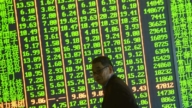【新唐人2014年02月22日訊】中國工廠活動二月份再次收縮,總部設於英國倫敦的「匯豐銀行」,週四發佈的中國製造業採購經理人指數PMI,加強了外界對中國經濟放緩的擔憂,並衝擊整個中國地區的市場。國際媒體指出,中國的經濟放緩加上信貸泡沫,加劇中共的政策困境。
匯豐銀行2月20號公布的中國PMI(製造業採購經理人指數),二月份初步調查的數據下跌到七個月以來的最低點–48.3,而一月份的數值,也在代表榮枯指標的界線50之下,只有49.5。PMI指數在50以下,代表經濟發展萎縮。
英國《路透社》報導,隨著PMI數據出爐,上海證券交易所綜合股價指數,2月20號從早盤漲幅回落,亞洲市場則暴跌。
而衡量中國勞工市場的匯豐PMI就業分項指數,已連續第四個月下跌,來到46.9。這是自從2009年2月份以來的最低點。代表中國的就業率也在下降。
《美聯社》報導說,匯豐銀行的調查顯示,過去兩年,中國經濟發展在無情的放緩。這是工廠活動連續第二個月收縮。一月份PMI下跌到49.5大大出乎外界預料,並攪亂了全球市場好幾天,投資者越來越擔憂中國巨大製造業的脆弱。
北京天則經濟研究所所長助理段紹譯:「製造業主要就是今年的總體經濟形勢不好。另外就是現在中國的勞動力,因為計劃生育這麼多年的影響,使勞動力的供給減少,勞動力的價格提高,使得很多企業利潤降低無利可圖,使這方面的出口量減少。」
中國工廠活動在二月份敗退,製造業重要指標下滑到七個月來最低,暗示進一步疲軟的經濟和劍拔弩張的市場。
美國《華爾街日報》引述花旗銀行經濟學家丁爽的話說﹕中國「經濟有持續的下行性壓力。」「在未來兩個季度,經濟增長將繼續下滑到7%。」 而日本野村證券經濟學家張智威說,中國「第一季度GDP增長將放緩到7.5%,在第二季度將放緩到7.1%。」
北京天則研究所所長助理段紹譯認為,除非政府進一步加快改革,把市場潛力激發出來。否則以目前的條件,中國經濟肯定將放緩。段紹譯強烈倡導「國企私有化」和「土地私有化」,他認為,這將提高生產效率。
段紹譯:「我覺得有很多方法可以使中國經濟快速增長。比方說,應該把更多國有企業私有化。還有就是土地,農民土地如果能夠進一步私有化,這些都是有利於中國經濟進一步快速增長的兩個重要條件。但是政府並沒有這方面想法。」
中國經濟放緩的同時,信貸泡沫也很嚴重。中國的銀行借貸和其他信貸在一月份強烈擴張,新增銀行貸款達到1萬3000億元,面對雙重夾擊,中共當局處於決策困境。
《華爾街日報》的報導說,增長在放緩,部份是因為當局擔憂金融領域的信貸泡沫,因此推高了借貸的成本。但是政府熱切希望不要過於猛烈的踩下借貸的剎車,擔憂這樣將導致更加低迷的增長和升高的失業率。
一些觀察者說,中國應該允許增長放緩,因為它正從依賴信貸投資的經濟模式,轉向提高消費角色的模式。而政府是否鼓勵低增長的一個考驗將發生在下個月。中共「兩會」召開期間,當局將發佈2014年增長目標。
去年年初,隨著中國經濟增長放緩,政府介入,實施基礎設施支出的微刺激方案,提升了經濟活動,但是也增加了國家的債務負擔。
在中國製造業下滑的同時,製造業巨頭「富士康」有淡出大陸,轉戰它國的跡象。據《美國之音》報導,「富士康」計劃在智能手機風靡的印尼首都雅加達投資10億美元。而在「富士康」與雅加達市達成協議之前,已經在美國賓夕法尼亞州完成了一項研發機器人,花費4000萬美元的交易。「富士康」表示,它正在研究美國其它三州,準備進行投資。
採訪編輯/秦雪 後製/舒燦
Policy Dilemma over Manufacturing Decline
China’s manufacturing shrank again in February according to the HSBC Purchasing Managers’ Index (PMI) on Thursday. This concern over the Chinese economy slow down and credit bubble have affected the entire Chinese market and exacerbated
a policy dilemma in China.
HSBC reported that China’s February PMI fell to a 7-month low of 48.3 from January’s final reading of 49.5, where a reading below 50 indicates a contraction in the economy.
Reuters report: The Shanghai Composite Index .SSEC gave up its early gains
on the news, while Asian markets tumbled.
Reuters report: The PMI’s employment sub-index fell for a fourth straight
month to 46.9, its lowest point since February 2009, during the global financial crisis.
Reteurs report: February’s PMI reading is the second month in a row that activity has contracted, after a larger-than-expected fall to 49.5 in January roiled global markets for days as investors grew concerned about fragility
in China’s huge manufacturing industry.
Duan Shaoyi, Unirule Institute of Economics, Beijing: The entire factories are mainly in a bad situation this year. Also, the labor sources have been reduced because of the one-child policy. The elevated labor costs have reduced the profit and subsequently the export volume.
Wall Street Journal (WSJ) reported: China’s factory activity lost ground in February, as a key gauge of manufacturing slipped to a seven-month low, signaling further economic weakness and rattling markets.
Economist at Citigroup, Ding Shuang told WSJ: There is continued downward pressure on the economy, and Economic growth will continue to decline to 7% over
the next two quarters.
Economist of Beijing Unirule Institute of Economics, Duan Shaoyi anticipates that the Chinese economy will continue to slow down until the market potential is stimulated by reform. Duan Shaoyi stressed high productivity and efficiency rely on the privatization of state-owned enterprises and land.
Duan Shaoyi: There are many ways to accelerate economic
growth in China. For instance, the privatization of state-owned enterprises and
land would be beneficial to Chinese economic growth.They are the two main factors to speed up growth. However, the government have no such thoughts.
While the Chinese economy slows down, the credit bubble is also getting serious.
China’s bank lending and credit loans in January have expanded strongly in January. The new bank loans have reached 1.3 trillion yuan ($US 214 billion). The Communist regime is faced with a dilemma.
Wall Street Journal (WSJ) reported: Growth is slowing in part because authorities, concerned about credit bubbles in the financial sector, have
pushed up the cost of borrowing. But the government is keen not to apply the brakes on lending too fiercely, fearing this could lead to even lower growth
and rising unemployment.
Some observers say China should allow growth to slow as it transitions away from an economy dependent on credit-fueled investment to one in which higher levels of consumption play a greater role. A test of whether the government can countenance lower growth will come next month, when authorities unveil a growth target for 2014 at the opening of the once-a-year meeting of China’s
largely ceremonial parliament.
WSJ: As growth slowed early in 2013, due in part to tighter lending conditions, the government stepped in with a mini-stimulus package of infrastructure spending that lifted economic activity but added to the nation’s debt burden.
While China’s manufacturing decline, Foxconn is seeking alternative clientele outside of China. Voice of America reported, Foxconn’s latest ambition calls
for investing $1 billion in Jakarta, Indonesia. Voice of America: Foxconn’s agreement with the city of Jakarta follows a deal in November to spend $40 million on robotics…in the U.S. state of Pennsylvania.
Foxconn was also studying three other U.S. states for investment
Interview & Edit/Qinxue Post-Production/Shucan

























